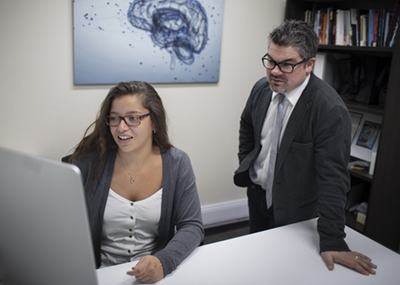Social Neuroendocrinology Lab Research Published in Psychological Journal
Nipissing University researchers, working in collaboration with students, faculty members, lab technicians, and medical doctors from Simon Fraser University, the Northern Ontario School of Medicine, and the University of Massachusetts-Boston have seen their work published in Psychological Science, one of the most prestigious journals in the field of psychology. The research was conducted at Nipissing University by Dr. Justin Carré, Department of Psychology; Dr. Shawn Geniole, Banting Postdoctoral Fellow; Nicole Marley, psychology honours thesis student; Triana Ortiz, Social Neuroendocrinology Lab (SNE Lab) Manager; and Ashley Marcellus, Central Analytic Facility lab technician.
Building upon previous research from Nipissing University’s SNE Lab which demonstrated that natural rises in testosterone during competition positively predict men's aggressive behaviour, the study aimed to examine whether testosterone played a causal role in promoting human aggression. The study, in which testosterone was administered to healthy young men, assessed self-report personality traits, genetic variation in the androgen receptor gene, and aggressive behaviour using a well-validated computer task.
Testosterone is a small steroid hormone produced in men and women, with levels that are highly responsive to the social environment. Over the past five years, researchers at Nipissing University’s SNE Lab have conducted experiments to examine the extent to which testosterone promotes aggressive behaviour. With an increased prevalence in the use of testosterone replacement therapy as a treatment option for men with low testosterone who have type 2 diabetes, the relevance of determining any potential negative behavioural effects of the treatment is important and may have clinical implications.
Results from the study indicated that testosterone on its own had a relatively weak effect on aggressive behaviour, however the effects were conditional upon the existing personality traits. Specifically, men who received testosterone engaged in substantially more aggressive behaviour, but only to the extent that they scored high in dominance, impulsivity, and independent self-construal - a finding that was replicated across independent studies (Study 1, 120 men; Study 2, 308 men). Further, the authors found that this effect was particularly pronounced among men with fewer CAG repeats within the androgen receptor gene, suggesting that testosterone's effect on aggression may be mediated through an androgen receptor mechanism.
“On its own, testosterone has a relatively small effect on male aggressive behaviour,” according to Dr. Justin Carré. “Nevertheless, individual differences in personality traits and genetic variation of the androgen receptor gene play critical roles in determining for whom, and through which biological pathways, testosterone potentiates male aggressive behaviour.”
Following the publication of this research, Nipissing University’s SNE Lab will be investigating testosterone’s role in modulating risk-taking, economic decision-making, and mating effort in a very large sample of young men. The work is being conducted in partnership with colleagues at the University College of London, Stockholm School of Economics, and University of Pennsylvania. To date, the project has tested over 500 research participants and hopes to conclude the study by August 2020.

